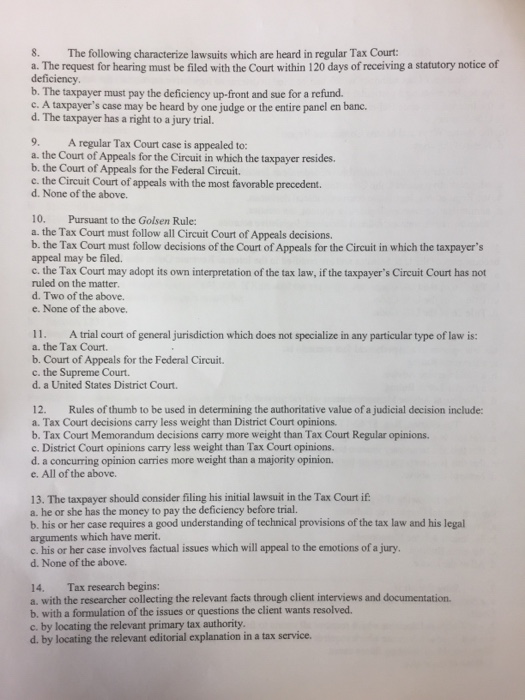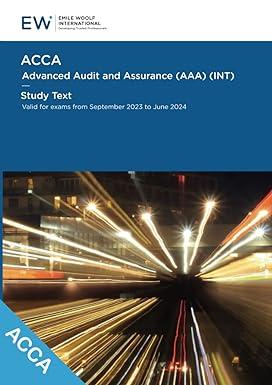Research in Federal Taxation 
The following characterize lawsuits which are heard in regular Tax Court a. The request for hearing must be filed withthe Court within 120 days of receiving a statutory notice of deficiency. b. The taxpayer must pay the deficiency up-front and sue for a refund. c. A taxpayer's case may be heard by one judge or the entire panel en banc. d. The taxpayer has a right to a jury trial. 9. A regular Tax Court case is appealed to a. the Court of Appeals for the Circuit in which the taxpayer resides. b. the Court of Appeals for the Federal Circuit. c. the Circuit Court of appeals with the most favorable precedent. d. None of the above. 10. Pursuant to the Golsen Rule: a. the Tax Court must follow all Circuit Court ofAppeals decisions. b. the Tax Court must follow decisions of the Court of Appeals for the Circuit in which the taxpayer's appeal may be filed. c. the Tax Court may adopt its own interpretation of the tax law, ifthe taxpayer's Circuit Court has not ruled on the matter d. Two of the above. e. None of the above, 11. A trial court of general jurisdiction which does not specialize in any particular type of law is: a. the Tax Court. b. Court of Appeals for the Federal Circuit. c. the Supreme Court. d. a United States District Court. 12. Rules of thumb to be used in determining the authoritative value of a judicial decision include: a. Tax Court decisions carry less weight than District Court opinions. b. Tax Court Memorandum decisions camy more weight than Tax Court Regular opinions, c. District Court opinions carry less weight than Tax Court opinions. d. a concurring opinion carries more weight than a majority opinion. e. All of the above. 13. The taxpayer should consider filing his initial lawsuit in the Tax Court if a. he or she has the money to pay the deficiency before trial. b. his or her case requires a good understanding of technical provisions of the tax law and his legal arguments which have merit. c. his or her case involves factual issues which will appeal to the emotions of a jury. d. None of the above. 14. Tax research begins: a. with the researcher collecting the relevant facts through client interviews and documentation. b. with a formulation of the issues or questions the client wants resolved. c. by locating the relevant primary tax authority. d. by locating the relevant editorial explanation in a tax service








